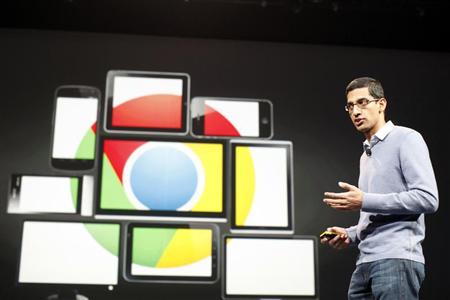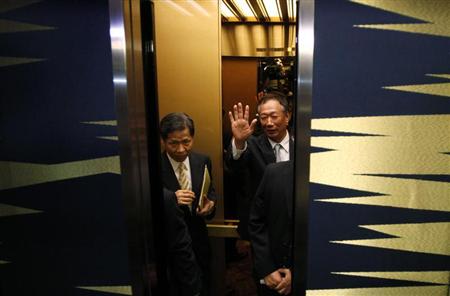A new study suggests that the universe is 80 million years older than previously thought, scientists said today. The study’s findings also help back up a theory about what happened just after the Big Bang. Learn more: http://yhoo.it/13gjR2e
(Photo: AP/ESA, Planck Collaboration via NASA)
(Photo: AP/ESA, Planck Collaboration via NASA)
A new examination of what is essentially the universe's birth certificate allows astronomers to tweak the age, girth and speed of the cosmos, more secure in their knowledge of how it evolved, what it's made of and its ultimate fate.
Sure, the universe suddenly seems to be showing its age, now calculated at 13.8 billion years — 80 million years older than scientists had thought. It's got about 3 percent more girth — technically it's more matter than mysterious dark energy — and it is expanding about 3 percent more slowly.
But with all that comes the wisdom for humanity. Scientists seem to have gotten a good handle on the Big Bang and what happened just afterward, and may actually understand a bit more about the cosmic question of how we are where we are.
All from a baby picture of fossilized light and sound.
The snapshot from a European satellite had scientists from Paris to Washington celebrating a cosmic victory of knowledge Thursday — basic precepts that go back all the way to Einstein and relativity.
The Planck space telescope mapped background radiation from the early universe — now calculated at about 13.8 billion years old. The results bolstered a key theory called "inflation," which says the universe burst from subatomic size to its vast expanse in a fraction of a second just after the Big Bang that created the cosmos.
"We've uncovered a fundamental truth of the universe," said George Efstathiou, director of the Kavli Institute for Cosmology at the University of Cambridge who announced the Planck findings in Paris. "There's less stuff that we don't understand by a tiny amount."
The map of the universe's evolution — in sound echoes and fossilized light going back billions of years — reinforces some predictions made decades ago solely on the basis of mathematical concepts.
"We understand the very early universe potentially better than we understand the bottom of our oceans," said Bob Nichols, director of the Institute of Cosmology and Gravitation at the University of Portsmouth in Britain. "We as humanity put a satellite into space, we predicted what it should see and saw it."
Physicist Sean Carroll of the California Institute of Technology, who was not involved in the project, called it "a big pat on the back for our understanding of the universe."
"In terms of describing the current universe, I think we have a right to say we're on the right track," he added.
Other independent scientists said the results were comparable on a universal scale to the announcement earlier this month by a different European physics group on a subatomic level — with the finding of the Higgs boson particle that explains mass in the universe.
"What a wonderful triumph of the mathematical approach to describing nature. The precision is breathtaking," Brian Greene, a Columbia University physicist, said in an email Thursday. "The satellite is measuring temperature variations in space — which arose from processes that took place almost 14 billion years ago — to 1 part in a million. Amazing."
The Big Bang theory says the universe was smaller than an atom in the beginning when, in a split second, it exploded, cooled and expanded faster than the speed of light — an idea that scientists call inflation. It's based in part on Albert Einstein's theory of general relativity — from about 90 years ago.
"The universe is described amazingly well by a simple model," said Charles Lawrence, the lead Planck scientist for NASA, which took part in the research. "What is new is how well the model fits both the old data and the new data from Planck."
The $900 million Planck space telescope, launched in 2009, is named for the German physicist Max Planck, the originator of quantum physics. It has spent 15 1/2 months mapping the sky, examining so-called light fossils and sound echoes from the Big Bang by looking at background radiation. When the light first burst out, it was blinding, but it is now fractions of a degree above absolute zero, Lawrence said.
The space telescope is expected to keep transmitting data until late this year, when it runs out of cooling fluid.
Planck's examination of the Big Bang's afterglow set the universe's age at about 13.8 billion years. Scientists often round up to 14 billion years anyway, and Caltech's Carroll said an additional 100 million years is nothing — like adding a month to the age of a 13-year-old. But 100 million years is important, countered Planck scientist Martin White: "100 million years here and there really start to add up."
The new results also mean there's slightly less dark energy in the universe than scientists figured. Instead of 71.4 percent of the universe being that mysterious force, it's 68.3 percent. This dark energy is smoothly spread throughout the universe and gives the "push" to its expansion, Carroll said.
The results also slightly boosted the amount of dark matter in the universe — up to 26.8 percent — and more normal matter, up to 4.9 percent. The concept known as the Hubble constant, which measures how fast the universe is expanding, was adjusted to be about 3 percent slower than scientists had thought.
But the bigger picture was how Planck fit the inflation theory, which physicists came up with more than 30 years ago.
Inflation tries to explain some nagging problems left over from the Big Bang. Other space probes have shown that the geometry of the universe is predominantly flat, but the Big Bang said it should curve with time. Another problem was that opposite ends of space are so far apart that they could never have been near each other under the normal laws of physics, but early cosmic microwave background measurements show they must have been in contact.
Inflation says the universe swelled tremendously, going "from subatomic size to something as large as the observable universe in a fraction of a second," Greene said.
Planck shows that inflation is proving to be the best explanation for what happened just after the Big Bang, but that doesn't mean it is the right theory or that it even comes close to resolving all the outstanding problems in the theory, Efstathiou said.
There was an odd spike in some of the Planck temperature data that hinted at a preferred direction or axis that seemed to fit nicely with the angle of our solar system, which shouldn't be, he said.
But overall, Planck's results touched on mysteries of the universe that have already garnered scientists three different Nobel prizes. Scientists studying cosmic background radiation won Nobels in 1978 and 2006, and other work on dark energy won the Nobel in 2011.
At the news conference, Efstathiou said the pioneers of inflation theory should start thinking about their own Nobel prizes. Two of those theorists — Paul Steinhardt of Princeton and Andreas Albrecht of University of California Davis — said before the announcement that they were sort of hoping that their inflation theory would not be bolstered.
That's because taking inflation a step further leads to a sticky situation: An infinite number of universes.
To make inflation work, that split-second of expansion may not stop elsewhere like it does in theobservable universe, Albrecht and Steinhardt said. That means there are places where expansion is zooming fast, with an infinite number of universes that stretch to infinity, they said.
Steinhardt dismissed any talk of a Nobel.
"This is about how humans figure out how the universe works and where it's going," Steinhardt said.
Efstathiou said the Planck results ultimately could spin off






